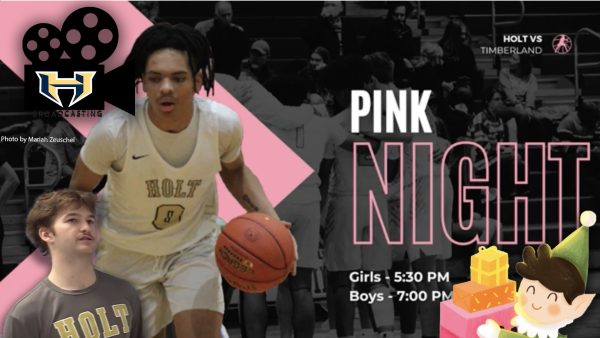CUSA’s Mission to Bridge Racial Divides

CUSA’s logo was student made and is intended to convey a sense of integration with the intercrossing colors.
CUSA, the Culturally United Student Association, was created last year by students to promote minority culture as well as to open a dialogue over the discrepancy or divide they were feeling as minority students at Holt.
“CUSA is somewhere where you don’t necessarily all feel bad together, but celebrate our cultural differences,” said Mrs. Mills, the sponsor for CUSA.
Students Armani Scholar who is now graduated and senior Jhamal Rice came to Mrs. Mills and wanted to start a club to discuss their shared experiences as minority students. Whether it is discrepancies in their treatment they have felt due to their race, or aspects of their race and culture that they take pride in, open dialogue and discussion is a major key in what CUSA wishes to achieve.
“It is completely student run, it was founded by students, the ideas, everything you hear about CUSA is totally student generated,” said Mills.
Whether it is a racial, religious or cultural divide, CUSA seeks to bridge the difference between them as a way to improve not only diversity, but also understanding. People at Holt generally stick with what is familiar, even if there is no intended segregation or malice behind it. In the Hallway it is easily seen that white students talk with white students, and minority students talk to other minority students the most.
“We’re all about integration. We want people to feel comfortable being who they are and to feel comfortable being around people who are different from them,” said Jhamal Rice (‘20).
Associating with people like you is not inherently bad or discriminatory, it is just what people feel to be easiest and most comfortable especially in environments like high school where making friends fast is a necessity. Instead of condemning associating with those similar to you, CUSA instead seeks a more positive message and encourages getting comfortable being around people who have different ideas and beliefs.
“Of course people are going to hang out with people they can relate to. Me and my friends noticed that white people sit with white people, black people with black people, hispanics with hispanics,” said Rice.
Collective colorblindness is not the objective of CUSA, as that would ignore the cultural differences the club embraces and celebrates. Different skin tones or different background cultures will obviously, cause large differences in our life experiences, and CUSA wishes to, not only embrace these differences, but also acknowledge any disparities that may lie therein.
“It starts by acknowledging that we have different backgrounds and different cultures and there’s nothing wrong with that,” said Mills.
People who do not have that first hand experience of racism, whether it is being a witness to it or even at the direct end of it, often times will not acknowledge it as being true or present. The student creators of CUSA wanted a place where they could feel like they could be heard about their observations as minority students.
“There’s a lack of awareness that your experience will be different than my experience truly based on the color of our skin,” said Mills.
And that is where CUSA’s main goal lies. They seek to spread awareness and form bonds, with others in order to create an understanding and comfortable atmosphere between students at Holt that is able to bridge any divide that might form whether is be race, religion or culture. Mrs. Mills invites everyone at Holt to attend CUSA’s fourth annual soul food night on February, 21.












Jaden Walls • Feb 4, 2020 at 12:08 PM
i loved this article , it was amazing also congrats to jacob on the first to get best of SNO .